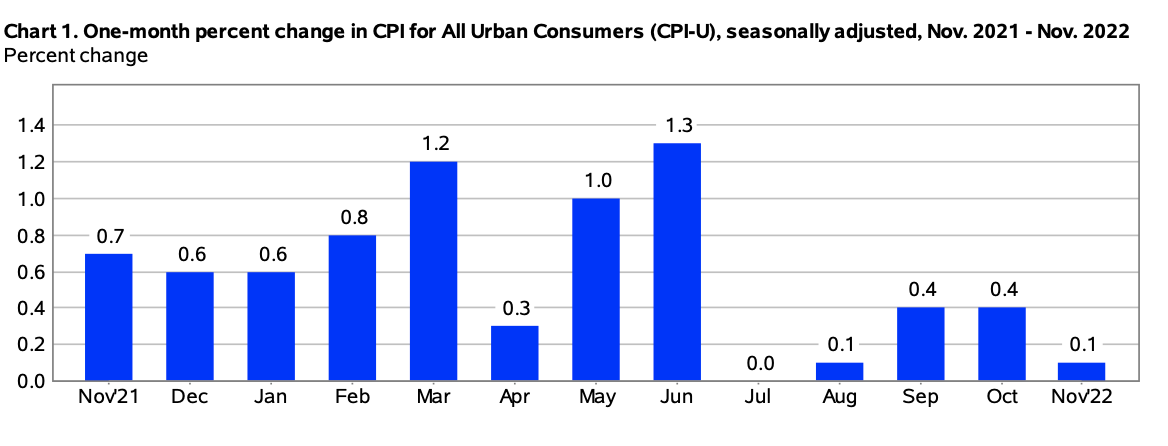© Reuters. FILE PHOTO: An electronic board shows Shanghai and Shenzhen stock indexes, at the Lujiazui financial district, following the coronavirus disease (COVID-19) outbreak, in Shanghai, China October 25, 2022. REUTERS/Aly Song/File Photo
By Lawrence Delevingne
(Reuters) – Wall Street stocks jumped on Tuesday – only to pull back by early afternoon – while Treasury yields fell and the dollar weakened as new U.S. government data showed the smallest annual increase in inflation in nearly a year.
The consumer price index increased 0.1% last month after advancing 0.4% in October, the Labor Department said. Economists polled by Reuters had forecast the CPI gaining 0.3%.
The slowdown could give the Federal Reserve cover to start scaling back the size of its interest rate increases on Wednesday.
“This month’s report provides confirmation of October’s step down in inflation pressures and is welcome news for the Fed,” Morgan Stanley (NYSE:) strategists wrote in a note on Tuesday morning.
“Tomorrow’s reduction in the pace of tightening to 50 (basis points) was already telegraphed, and with the downtrend in inflation becoming entrenched, the FOMC can set its sights squarely on the labor market.”
Global stocks jumped on the news but then pulled back to more modest gains or slight losses.
Of the main U.S. indexes, the fell about 0.2%, the gained 0.2% and the added 0.35%.
The pan-European index rose 1.3% and MSCI’s gauge of stocks across the globe gained 0.8%, a pullback from larger gains earlier in the day.
U.S. Treasury yields dropped sharply on the November inflation data.
The yield on was down 11.4 basis points to 3.498%; 30-year yields fell 8.1 basis points to 3.493%, and two-year yields, which typically move in step with interest rate expectations, dropped 19 basis points to 4.21%.
The dollar also reacted, dropping against the yen and euro. Against a basket of major currencies, it was down nearly 1% on the day. It was already down in the fourth quarter, largely because investors believe U.S. inflation has peaked.
The pound gained against dollar, up about 0.8% to $1.236, after data showed a rise in UK unemployment and an increase in wage growth that will keep Bank of England (BoE) policymakers on edge when they meet this week.
The Fed, European Central Bank and BOE are expected to raise rates by 50 basis points (bps), rather than the 75 bps hikes they delivered earlier in the year.
“If data such as today’s suggest a real trend that the momentum of inflation is lower, we could then see the Fed pause over the next few months at a still restrictive policy-rate, but not one which would put potentially excessive pressure on the economy,” Rick Rieder, BlackRock’s Chief Investment Officer of Global Fixed Income, said in a statement.
COMMODITIES UP
Oil rallied for a second day, having jumped 2.5% on Monday, with up 3.4% to $75.66 per barrel and at $80.70, up 3.47% on the day. The market was buoyed by concern about supply disruptions, including the ongoing shutdown of the Canada-to-U.S. Keystone crude pipeline following a massive leak.
Gold, which is sensitive to shifts in U.S. inflation, also gained, with up 1.5% to $1,808.29 an ounce and U.S. up 1.77% to $1,812.10 an ounce.
In cryptocurrencies, bitcoin climbed around 3% to $17,688, and crypto-related stocks gained, even as FTX founder Sam Bankman-Fried was arrested and charged by U.S. regulators.
















